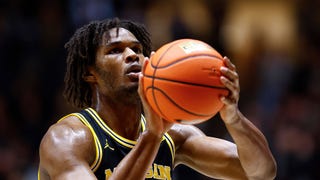It's been more than eight months and as many as 17 mistresses since Tiger Woods backed his SUV into a tree outside his home and shifted the eyes of the world from his unparalleled golf game to his possibly unparalleled marital infidelity.
Woods still carries 14 clubs in his golf bag, but as he trudges along the fairways in this summer of his discontent, it's clear that he's misplaced something more important than a five-iron. He's lost his mojo. And as he tees off in this week's WGC-Bridgestone Invitational in Akron, Ohio -- a tournament he's won seven times -- The World's Greatest Golfer has every reason to wonder if he'll ever get it back.
Since his return to competitive golf in April, Woods has played in only seven tournaments; by this time last year, he'd competed in 17. And he hasn't won a single event. He tied for fourth in both the Masters and the U.S. Open – tournaments he dominated for years – and he finished a disappointing 23rd in the British Open, a tournament he's won three times.
He ranked 86th in Driving Accuracy Percentage last year; now he's No. 142. He was 23rd in Putting Average, one of his strongest assets; now he's No. 93. He was 16th in Greens in Regulation Percentage; now he's No. 111.
He's was No. 1 in the FedEx Cup standings last year … now he's No. 111.
Sports psychologists say the cause of the sharp decline in Woods' numbers may not be found in his backswing or putting stance – but, rather, in his head. They say Woods is a textbook case of an athlete in a psychological slump.
"I think what's going on with Tiger is he has this immense stress that he may not be appreciative of that's affecting and leaking into his game," said Dr. Gregg Steinberg, a sports psychologist and consultant to college and professional athletes whose clients include PGA tour members. "He might be looking for different answers, like in his physical game, but it's really the emotional game where he needs to work on the stress in his life."
Steinberg says Woods needs a win to keep his lack of self-confidence from snowballing, and a victory at Bridgestone this weekend – leading up to next week's PGA Championship -- could be the boost he needs. But a poor showing could be very bad.
"The longer he doesn't win, the harder it gets for him to win," Steinberg said. "So if he doesn't win a major this year, it's going to be harder next year to win."
Despite the sex scandal and his decline on the links, Woods is still the most-liked athlete in the U.S., according to a Harris Interactive Poll conducted in June. And he is still favorite to win the PGA at Whistling Straits in Wisconsin next week, according to sportsbetting.com. This show of support suggests the public believes Woods can still beat the competition, even when he's not at his best.
"The PGA tour is really two levels above college. Tiger also was maybe two levels above the PGA tour, he was that good. He was on his own tour," Steinberg said. "So he was on the Tiger tour, and now he's back to the PGA tour."
Sport psychology consultant Dr. Jack Llewellyn, who has counseled professional athletes whose performances suffered because of turbulence in their personal lives, says he thinks Woods can return to the "Tiger tour," but only if he is willing to admit there is a flaw in his mental armor and takes an honest look at his issues.
Llewellyn said Woods might be trying too hard in order to make up for lost time.
"You drift into working too hard and too much, and you don't give credit to how important the mental game is," Llewellyn said. "Hit 100 shots with a purpose as opposed to just swinging the club 300 times."
When emotional distractions detract from one's ability to concentrate on the game, Llewellyn says, it's important to compartmentalize different parts of life.
"It's kind of like having a chest of drawers in your mind, so that you can put some of these distractions in a drawer and then take them out and go and think about them when you've got time."
Llewellyn says he has his clients list their assets and liabilities on a business card. On a bad day, they can easily whip out their assets.
"What you're going to find when you make those two lists is that, golly, when things are not going well, I'm spending a lot of energy avoiding my liabilities, and I almost put my assets aside," Llewellyn said.
He said he thinks Woods can begin to revive when he builds his life and game around his assets.
Woods' list of liabilities may appear longer than his list of assets right now, but he is still No. 1 in the Official World Golf Ranking -- though that could change by the end of this year.
"The better he takes care of himself mentally and physically, the more quality energy he's going to have to play the game," Llewellyn said. "He's got to get that back, because he always had it, and somewhere along the line it just got misplaced a little bit.
"And if you had it, you can get it back."








































